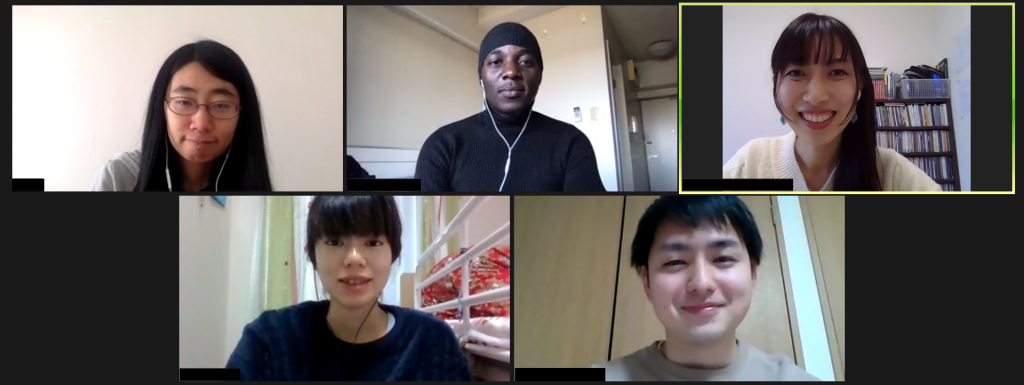春休み期間中、大学の世界展開力強化事業(アフリカ)が行ったオンラインの日本語初級コースの講義を受けました。アフリカからの留学生のほとんどにとって、日本語は文法も発音も母語とは大きく異なるため、習得するのがとても大変だと言います。さらにコロナ禍では人と頻繁に会うことは難しく、日常生活のなかで自然に学ぶ機会も奪われてしまっていたのだと、私たちも彼のエッセイを読んで初めて知ることになりました。今回のオンライン日本語教室は、同じく日本語を学ぶ他の留学生たちやボランティアで参加し習得をサポートしてくれた日本人学生たちと親しくなれたという点でも、ジャスタスにとって有意義な体験となったようです。
以下、ジャスタスのエッセイです。

Attending online Japanese Classes (Beginner level) 8th,19th, and 25th/02/2021.
Before coming to Japan, learning the Japanese language and culture was one of my major interest. I'm trying, by all means, to achieve this goal by the end of my academic program. However, it's so unfortunate that the pandemic restrictions are severely impacting several social and academic programs which would provide a conducive atmosphere for learning the Japanese culture and language via social interactions. Thus, in order to achieve the above interest, I had to attend Japanese language classes.
In February 2021, I was invited to participates in the online programs organized by the Inter-University Exchange Program, TUFS. One of these programs was the Japanese classes (Beginner level and Intermediate level) which we held from 18th, 19th, and 25th February 2021. Actually, these classes were held as a second step in collaboration with the PCS "Survival Japanese" classes. The main purpose for organizing these classes was to prepare and provide exchange students with basic oral communication knowledge as per the participant's requested topics of interest.
These classes were very diverse with people from different nationalities and cultures with different unique characters. In the classes, we had students from Japan, Burundi, Ghana, Kenya, Syria, Tunisia, Uganda, Haiti, and Nepal. Interestingly enough, some of the participants were undergraduate, master's, and Ph.D. students. The medium of communication during the classes was both English and Japanese for better understand. Importantly, The Inter-University Exchange Program cooperated with several native Japanese speakers (students major in Africa culture) who worked hand in hand with the facilitators to ensure a smooth platform for studying especially to the naive Japanese-speaking participants like me. They helped through corrections check-up, accurate pronunciation, reading of characters, role-playing, translations, interpretation, and explanation of some topics. Actually, the Japanese students seemed impressed at how international students were trying to master their language and culture.
In the Japanese classes, I got a chance to practice some Japanese and learn how to introduce myself in Japanese, how to ask for directions, how to order meals, how to explain my symptoms to the doctor for the first time, verbs for shopping, and how to book an apartments. Importantly, during the break-out sessions, I had a chance to interact with other students and made friends. Participating in these classes wasn't only helpful for academic purpose but for social reasons too. During the boring days of the pandemic, I had badly needed people to interact and hang out with sometimes in the future. Indeed I got a chance to get connected to some of the participants who are helpful in my pursuit of learning Japanese language and culture etc.

